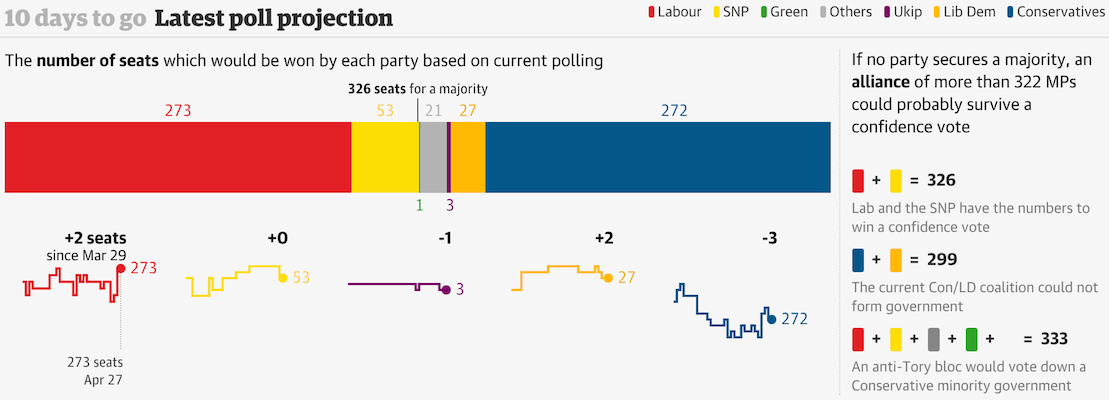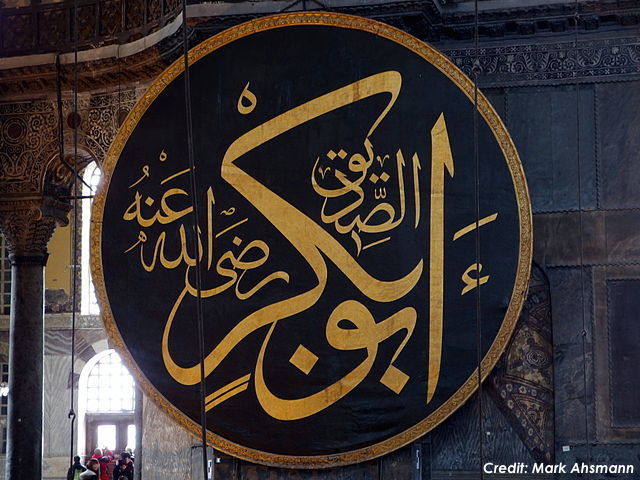Hard to fathom the mindset of the many people who are more outraged by some broken windows and theft of petty goods than by the police breaking someone’s spine in multiple places until he died slowly and painfully.
Category Archives: Arsenal Pulse
The ironclad unkeepable promises of the UK elections
UK party leaders making firm promises about coalition arrangements (or rejected arrangements) that they mathematically can’t possibly keep are one way voters lose all trust in their public officials. I get that they’re trying to discourage splinter/protest voting by taking a hard line without wiggle room before the election, but the math just isn’t there to be saying stuff like this, and at a certain point it’s just pure misrepresentation of reality.
Labour and Liberal Democrat leaders in the past couple weeks have been painting themselves into a corner on coalition promises, wherein they’ll either force a 2nd election or have to dynamite the corner to escape the foolish pre-election promises.
If the Labour Party will not make any kind of deal with the SNP (which is their latest position) and the Conservatives and Liberal Democrats won’t either, how exactly is anyone supposed to form a government? Excluding the fairly astronomically unlikely possibility of a Conservative-Labour grand coalition, no two parties (or even three!) will have enough seats for a majority without involving the SNP. Everyone will be 20-50 seats short.

Projected number of seats to each party and combinations of various parties via The Guardian. Click to enlarge.
Are you going to throw this over to Northern Ireland to pick the PM? (Is that really better than letting Scotland do it?) Are you going to force new elections? What’s the realistic game-plan here?
What exactly is Chris Christie’s view on contract law?
A NJ.com headline caught my eye: “‘Contract’ isn’t a magic word in N.J. pension legal battle, lawyers argue”
A claim by public worker unions that they have a right to full pension funding challenges the core of New Jersey’s constitutional structure, attorneys for the state said in a brief filed Friday.
I find odd the silence from Republicans (and everyone else?) as Gov. Chris Christie’s attorneys appear to challenge the fundamental supremacy of the rule of contract law that holds together much of Anglo-American jurisprudence and property law.
I mean, I guess there’s a valid question about whether or not the state can make and be bound by contracts in violation of the constitution, but I’m not really sure the contract in question is in violation of the constitution.
To my untrained eyes at least, they’re making some pretty bizarre constitutional arguments (mostly centered on state balanced-budget requirements and the like) to prove that contention.
In principle, it sounds similar to the arguments being raised (on the issue of constitutional tax caps) by moderate tax reform advocates, about not binding future legislators by decisions of current legislators/voters — except that in Colorado’s case, they’re challenging the validity of certain state constitutional provisions (which took away the legislature’s effective authority to raise taxes at all) under the U.S. Constitution, rather than (as New Jersey is doing) trying to void contracts because they conflict with stringent state constitutional requirements.
Moreover, even if the New Jersey contracts are indeed unconstitutional, issuing bad-faith contracts is a pretty big problem as far as governing strategies go…and also tends to undermine the strength of contract law in the country.
I don’t have much else to add on this topic at the moment, but I’m flagging it now in case it develops into a bigger story later.
Hindu nationalist PM not very vocal against Hindu terrorism
A New York-based Indian civil rights activist questions Prime Minister Narendra Modi’s “deafening silence on activist assassinations” in an op-ed for Al Jazeera America.
Modi has remained silent about the recent spate of assassinations, attacks and threats from an umbrella of far-right forces, including Sanatana Prabhat, Bajrang Dal, Abhinav Bharat and other paramilitary groups implicated in organized massacres or terrorist bombings. Attacks against Christians and Muslims have increased. Violence against Dalits [untouchables] and women is also on the rise, stoked by a political culture of cruel disregard for the marginalized. This alarming current of far-right fundamentalism has crept into India’s cultural and political spheres more quickly and dangerously than even its critics had feared.
[…]
These religious-right forces have been glorifying Nathuram Godse, Mohandas Gandhi’s killer and an RSS member, and even plan to build a temple in Godse’s name. If allowed to go unchallenged, this hateful ideology — manifested in assassinations, the desecration of churches and the intimidation of secular activists and minorities — will shatter the dream of a free, pluralistic and democratic India.
It is, of course, not terribly surprising that this non-response would come from the administration of Prime Minister Modi, whose international claim to fame before taking the helm of India’s government last year was his alleged role in genocidal incitement against Muslims during the February 2002 riots in the state of Gujarat, when he was Chief Minister there. Although investigations in India have never officially tied him to causing the fatal mass violence that followed, he certainly didn’t do much to prevent or stop it. His ruling BJP has long stoked tensions against non-Hindus (and neighboring Pakistan) to drive its voter turnout, although that was not the main factor in their decisive 2014 victory over the corrupt and incompetent Congress Party.

27 days in, high toll compels Saudis to halt Yemen bombing
Note added April 22, 2015: Less than a day later, Saudi bombing resumed. The naval blockade will continue indefinitely.
27 consecutive days of Saudi-led airstrikes in Yemen will come to an end.
Saudi Arabia’s government claims they have met their tactical objectives against the Houthi rebels, and averted their “takeover” of the country, but there’s actually no immediate sign that the Houthis have been dislodged or even substantially set back, let alone defeated. The New York Times reported that Houthi-held territory, from the Saudi border to the capital to the coast, remained entirely intact after the 27 days of bombing.
The bigger reason compelling a halt to the bombing seems to be the very high civilian death toll and infrastructure annihilation from the Arab coalition’s fairly sloppy or lazy targeting. NYT:
The Saudis have come under international pressure because of the bombings, which hit a number of civilian targets, including a camp for displaced Yemenis, in which dozens were killed, and a storehouse of emergency aid administered by Oxfam, the relief agency. Oxfam called that strike “an absolute outrage.”
On Monday, the Saudis struck a target near Sana, the capital, that caused an enormous explosion that left at least 25 people dead, medical officials there said.
In isolation, perhaps the Saudi government would not care about that, but the United States applied pressure on the matter:
A senior American official said “there have been discussions” in the past several days among officials from the United States, Saudi Arabia and the United Arab Emirates, a Saudi partner in the campaign, about ending the bombing. Asked why, the American official, speaking on condition of anonymity, said: “Too much collateral damage.”
Anonymous U.S. generals at CENTCOM reportedly say they were given no advanced warning by Saudi Arabia before the start of the operation last month and believed it was “a bad idea.”
This U.S. concern with the high civilian toll is itself because…
“A good number of the American arms that have been used in Yemen by the Saudis have been used against civilian populations,” said Daryl Kimball, executive director of the Arms Control Association, an assertion that Saudi Arabia denies.
It is unclear so far whether the Saudi naval embargo will also be lifted, allowing vital food and water aid to be delivered to the starving Yemeni population.
O’Malley on GOP economics: “Kind of patently bullshit”
Former Maryland Gov. Martin O’Malley, weighing a Democratic presidential bid, continued to hit his recent themes of re-regulating the economy to protect ordinary people, in a pre-recorded upcoming NPR interview, this time much more strongly:
“And, certainly, the concentrated wealth and accumulated power and the systematic deregulation of Wall Street has led to this situation where the economy isn’t working for us. All of that is true. But it is not true that regulation holds poor people down or regulation keeps middle class from advancing. That’s kind of patently bullshit.”
NPR’s full interview with former Maryland Gov. Martin O’Malley will be broadcast Monday on NPR’s Morning Edition.
O’Malley also asked:
“The bigger issue is, do we have the ability as a party to lead by our principles? Or are we going to conduct polls every time we try to determine where the middle is on any given day?”
The former governor also recently addressed the National Action Network (Al Sharpton’s organization) and spoke at quite some length — drawing upon his experiences as Governor of Maryland and Mayor of Baltimore — about the death of Walter Scott, police violence against Black Americans more broadly, and the general challenges surrounding race in America today. More than six minutes of excerpts were posted in this video:
Most of his remarks were pretty solid, in my opinion, and I think it’s been a while since a White politician spoke this openly with these words for this amount of time on this issue.
An age-old struggle that isn’t age-old
In Washington conventional wisdom these days, the Middle East has been an endless sectarian struggle between Sunnis and Shiites since the split of 632 CE.
In the Middle East’s actual reality, there were 13 centuries where that wasn’t actually true. There was plenty of fighting, just as there was pretty much everywhere else at the time, but that wasn’t the motivating factor.
Nick Danforth explains:
Perhaps the biggest problem with this historical narrative is that it ignores everything that happened between 680 and, say, 1980. Op-eds about the “ancient” and “age-old” Sunni-Shiite warfare rarely reference this crucial 13-century period — a.k.a. the entire time during which Sunnis and Shiites were supposedly in conflict. Like everywhere in the world, people in the region were definitely fighting during this time. Historians could even provide a couple good examples of battles along Sunni-Shiite lines. But sectarian identity was seldom the chief issue that brought people in the Middle East to war.
The full piece is excellent and provides lots of citations in the links, some of which were also very cool to read. Danforth also offers some thoughts on how certain factions today are exploiting the perception of a timeless sectarian split to ensure everyone rallies to one side or the other out of self-preservation against the other side.

Calligraphy in Istanbul of the name of Abu Bakr, the Caliph whose selection first divided the Sunni and Shia followers of Islam. (Credit: Mark Ahsmann)


